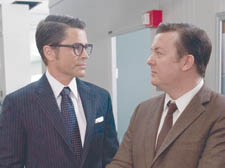|
|
 |
| |

Rob Lowe as Brad and Ricky Gervais as Mark in The Invention of Lying. |
Truth is, he can’t escape Brent role
THE INVENTION OF LYING
Directed by Ricky Gervais
Certificate 12a
IN a world where humans are wired to only tell the truth, the whole truth, and nothing but, things are not as good as you might imagine. In fact, we’re downright rude to one another, people’s deepest thoughts are on permanent display, and as for creativity – forget it.
This is the premise of a film produced, written, directed and starring Ricky Gervais.
He is Mark Bellison, a screen writer in a world where there is no fiction. Movies are simply a man sitting in an armchair recounting facts about previous centuries. Bellison has been lumbered with the 1300s – a time when all that happened was millions died of the black plague, a storyline no one in his office really fancies hearing again and again.
We learn that he is about to be sacked, and that the girl he has his eye on thinks he is OK company, but frankly too fat and not of the required standard of genes for them to get serious. This all comes out of course as he picks her up for their first date – she can’t help but be honest.
There is no dramatic tension – this is a romantic comedy after all, and we know exactly what will transpire – and therefore Gervais tries to make up for this by littering the story with joke after joke after joke. Sadly, too many are not that funny at first, but then things take an unexpectedly blasphemous turn for the better and Gervais roles out some gags which may, happily, cause offence.
He also uses the film to spout forth on the biggest lie ever told. His parody of religion, especially Christianity, suggests he has become frustrated by his time living in the US and the egg-shell nature of religious discussion in the States. To send his dear mum off to die with a smile on her face, he tells her there is a heavenly afterlife where everyone lives in mansions and spends their days popping in on best friends.
A whopper of this magnitude brings him fresh grief when medical staff hear this and take it to be the gospel, as they say: suddenly everyone wants to hear his story, so, with the help of a marker pen and some pizza boxes (instead of tablets) to write down this tale, he decides to make up some rules for everyone to abide by, as told to him by the “man in the sky”, who Mark claims to have spoken to.
It’s all incredibly blasphemous and all the better for it. It pours a massive bucket of cold water on the story of Christianity, and religion in general, and this satirical edge brings this film away from being simply a funny comedy into the realms of having a surprisingly philosophically enlightened bent.
Gervais also makes a great Jesus, a Nazarene of which even Robert Powell would be proud. The face he pulls as he turns to face the camera with a shoulder-length thatch and a brilliantly bushy beard lingers long in the memory.
But there is also a deeper question being asked here about lying and morality. Essentially, when is it OK not to tell the truth?
There is a super cast – Tina Fey as his grim secretary raises laughs (but I’d much rather watch re-runs of her doing Sarah Palin). Rob Lowe crops up as a rival love interest, a drop-dead gorgeous hunk, and is playing a spoof almost of himself.
Other faces include a sadly tiny role for Philip Seymour Hoffman, who is content to merely pour the odd pint in a bar for Mark, while he makes up his next whopper.
But there are some aspects of this film which dilute the joy. The girl of his dreams, while having a character straitened by the fact she always had to tell the truth, is a crashing bore.
Being honest doesn’t have to mean being shallow, but that is exactly what she is. You have to hope she doesn’t find the happiness she apparently deserves. She’s horrible.
Gervais as Bellison works, but he seems to have settled into a gentle groove turning in performances as the character he played so well in The Office. Bellison is very much like David Brent, transported into some weird alternate reality where honesty is not the best policy, but the only policy there is. |
 |
|
 |
| |
|
 |
|

